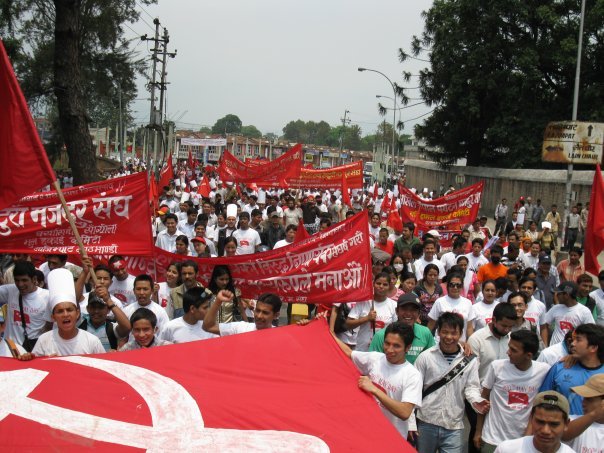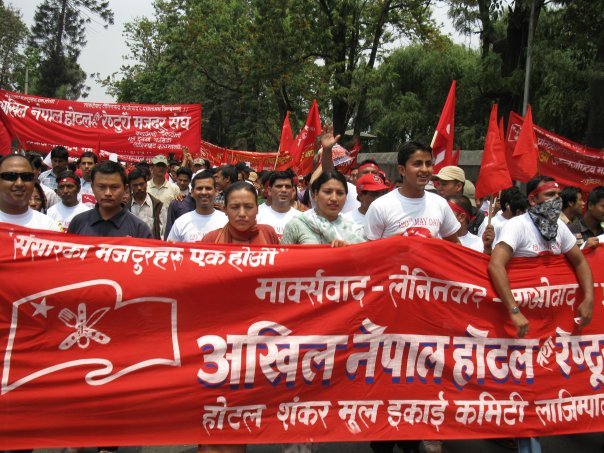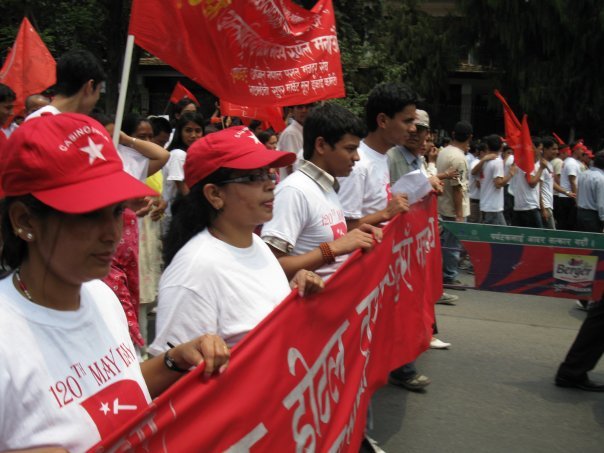Reprinted from Comrade Alastair.
Nepal’s Maoists are often accused of being anti-worker, Stalinist, bourgeois nationalist and so on by many on the Western ‘left’, particularly anarchists and Trotskyists. As ‘evidence’ towards this, it is often claimed that while in government earlier this year, they ‘banned strikes’.
Let’s set the record straight.
The Maoists never banned strikes. All the militant, class struggle fighting unions are Maoist unions, and since their change in tactics in 2006 and the shift of the struggle to the urban areas the Maoists have essentially taken over the trade union movement in Nepal, as well as the bulk of the student unions. They regularly lead strikes for both political issues and bread and butter issues like pay and conditions. They have strongholds amongst the teachers, hotel workers, petrol workers, workers in many SEZs and industrial zones, and more. They never stopped leading strikes – they just called a three day general strike across Nepal!
The Maoists briefly put forward a proposal to temporarily ban strikes in certain key sectors. This was at a time when the country had no electricity for most of the day, there was a food shortage and strikes and bandhs called by reactionary parties were causing chaos and undermining the Maoist-led government.
In Nepal, strikes are enforced with violence. Bandhs are called regularly by political groups and factions are supporters of the bandh roam the streets enforcing it with batons. If you can muster enough supporters to do that you can shut an area down fairly easily. In most cases the Maoists seem to be the only ones capable of mustering the support to enforce a bandh with any success, but it’s actually not a voluntary thing. So the UML, NC and even royalist affiliated unions and the parties themselves were capable of shutting down (or at least seriously interfering with) production with or without mass support amongst the workers, and when the Maoists were in government they were doing this with great enthusiasm.
Which leads on to the next point. Strikes in Nepal are never just issues of workers vs bosses. All the unions (as far as I’ve seen) are affiliated to political parties. Strikes are not just called by workers through their unions, they’re called by the workers affiliated to this or that political party, in consultation with that political party. You can disagree with this if you prefer the idea of independent workers unions doing their own thing, but these are the facts on the ground. Strikes are as much about a struggle between different political factions as they are about a struggle between workers and bosses.
It’s not a case of the hotel workers, and the teachers, and the bus drivers or whatever each having their own unions, it’s a case of the Maoist union, the UML union, the Nepal Congress Union, and so on. You never read about militant strikes being led by any unions other than Maoist ones, and I see no reason why the bourgeois media would simply ignore the other strikes. The Maoists are at the forefront of the class struggle in Nepal.
In a recent strike in a big industrial zone in Nepal, the workers began as part of a union affiliated to the UML. But as the strike dragged on, they became increasingly frustrated with the collaborationist, reformist attitude of their union, and ended up leaving it en masse to join a Maoist union instead, which eagerly picked up their cause and threw it’s resources behind their strike. This says a lot I think about the relationship the UCPN (M) has with the working class.
So when we talk about that brief (and yes, in my view, wrong) proposal by the Maoists to ban strikes it should be seen in this context. The reactionary parties were calling bandhs to undermine the government. These were having an effect on the country, which was just a total fucking mess. The economy was in shambles and there were shortages of all kinds of basic goods. So when the Maoists talked about temporarily banning strikes in some sectors, my guess is it was a ploy by them to prevent their political opponents from using their ‘unions’ to undermine the government and try and make the Maoists look bad by causing shortages and chaos.
Needless to say, the idea was briefly reported on then disappeared. The Maoists have continued to lead strikes all over the place, and the bourgeoisie in Nepal are quite pissed off about it. I suspect pressure from the unions affiliated to the party helped put the idea away.
The Maoists are not anti-worker. The hundreds of thousands of Nepalis that have marched in support of the Maoists in the past few weeks are workers. And when the Maoists topple the government they’re going to build a Nepal where the workers hold political and economic power.




So, the Nepali Maoists “never banned strikes”
But they “briefly put forward a proposal to temporarily ban strikes in certain key sectors”
So, in other words – they banned strikes!
My my my, Stalinist doublespeak at its finest!
Note the word “proposal,” as in not actually put into practice. Reading comprehension at its finest!
FFS, even if they did ‘ban strikes’, it would have been totally justified. The reactionary parties were trying to weaken the left wing government.
They were using the unions controlled by right wing parties to create strikes in key areas of the economy.
This situation was very similar to what happened in Chile during the early 70’s when middle class unions directed by the US were trying to ‘make the economy scream’ to bring Allende down.
How bloody stupid are these people to not understand these simple dynamics?
If you make a serious criticism of my piece, I’ll respond.
Until then, there’s been a lot of debate at this link, so feel free to have a read.
http://www.revleft.com/vb/did-nepals-maoists-t125960/index.html
Honestly Alastair, whos paying you?
Paying me?
Alastair, I think comrade Xiao Banfa thought your comment, “If you make a serious criticism. . .” was directed at him/her, because it was directly under his/her comment and didn’t realise it was actually directed at “Movie, Reviewed”.
Because stuff here appears simply in order of being posted, it’s probably always useful to name the person you’re responding to.
Phil
Sorry but the Maoists in Nepal are traitors to socialism just as the reformist pro-capitalist Communist Party of Nepal ( Unified Marxist Leninist ) is. After the last elections in 2008, the reformist Communist Party of Nepal ( Unified Marxist Leninist ) and the Communist Party of Nepal ( Maoists ) won 51% percent of the vote. Nepal could have been a socialist republic, but it is not.
The maoists wanted to work with the parties of capitalism to form a national government. Puspa Kamal Dahal became prime minister. He left this office after he could not sack the Nepalese Chief of the Army Staffs; Rookmangud Katawal.
So the maoists worked with the reformist CP-UML and the main capitalist Nepali Congress Party. They betrayed the trust of all those poor workers who hoped for change. Stalinism failed in Nepal again and again. It is a counter-revolutionary force and Nepal proves that.
After all the excuses, lies and distortions used by Western pro-maoists in unsuccessful attempts to discredit libcom articles showing that when in government the Nepali Maoists are in favour of strike bans; we see, just a month after UCPN(Maoist) began to again lead the government, that Maoist PM Bhattarai – along with the Maoist-affiliated ANTUF union – has brokered and endorsed a strike ban agreement with employers;
Quote:
http://www.thehimalayantimes.com/fullNews.php?headline=Govt+nod+for+No+Work+No+Pay+policy&NewsID=304515
” 30 Sep 2011
Govt nod for No Work No Pay policy
Added At: 2011-09-30 11:18 PM
Last Updated At: 2011-09-30 11:18 PM
HIMALAYAN NEWS SERVICE
KATHMANDU: The government today endorsed the March 24 agreement between employers and major trade unions that proposes implementing ‘No Work No Pay’ policy and providing social security allowance to workers.
Endorsing the deal, today’s meeting of Central Labour Advisory Committee, held under the chairmanship of Prime Minister Baburam Bhattarai, who is also looking after the Labour and Transport Management Ministry, made a four-point pact to maintain industrial peace.
Endorsing the March 24 pact between Federation of Nepalese Chambers of Commerce and Industry (FNCCI) and three major trade unions – General Federation of Nepalese Trade Unions (GEFONT), National Trades Union Congress and All Nepal Trade Union Federation (ANTUF) – the meeting has solved most of the labour-related problems in the industrial sector, Krishna Hari Puskar Karna joint-spokesperson for the ministry, said.
The government has pledged to introduce Social Security Act within three months.”It is a great achievement,” Bishnu Rijal, the GEFONT president, said. “We have also agreed to form a committee of employers, trade unions and the government to solve labour disputes,” he said, terming the move a milestone in the history of Nepali trade union. The meeting agreed to form a Minimum Wage Board and enforce the ‘industrial peace year’ declaration that envisages banning industrial strike for the next four years.
FNCCI has hailed the deal. “Employers are happy with the deal. We are withdrawing our case from Supreme Court,” said Pashupati Murarka, president of FNCCI’s Employers Council’, referring to the plea it had filed against the government in the Supreme Court for ‘neglecting’ the March 24 pact and publishing the labour ministry’s April 16 agreement with minor trade unions in the government gazette. The panel has hiked the monthly salary of tea estate workers by Rs 1,064. ”
See also; http://libcom.org/library/myths-realities-nepalese-maoists-their-strike-ban-legislations